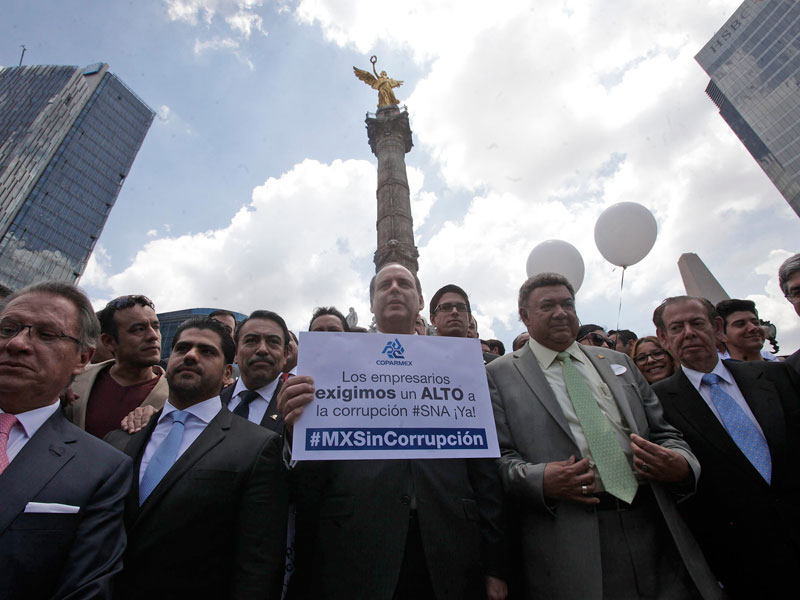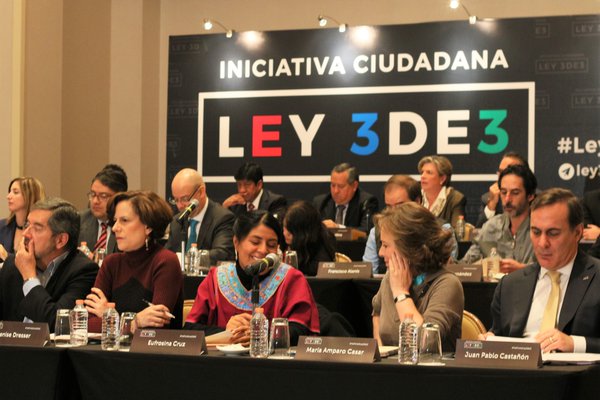The Mexican Congress drew complaints from the country’s business leaders after legislators extended to government contractors disclosure requirements aimed at eliminating graft in the public sector. A new bill recently submitted by public petition as part of a broad anticorruption overhaul requires public servants to make public their assets, interests and proof of tax filings.
Corruption is so woven into daily life in Mexico that it has been enshrined in a common saying “el que no tranza no avanza” (he who does not cheat, doesn’t get ahead); payoffs and bribes are the price of doing business in Mexico, that is a reality, there is an invisible line in the budget that usually goes unchecked.
But a package of anti-corruption measures recently approved by the national legislature could become a turning point in the country’s relationship with corruption.
We are talking about an initiative to impose public disclosure rules for all public servants, at all levels of government. Called the “3 de 3” (3 out of 3), the initiative would require government officials to reveal their assets and potential conflicts of interest, as well as prove that they are paying taxes.
This initiative also compels close relatives of public officials to reveal their assets, and would be among the farthest-reaching public disclosure measures in the world, its authors say.
The “3 out of 3” initiative is the result of a grass-roots effort. In 2014, a change in Mexican law allowed citizens to propose legislation with the support of at least 120,000 validated signatures. Before that, only the president and members of the Congress could generate legislation.
The measure, pushed by a group of community organizations, amassed more than 630,000 signatures and has received the support of influential business associations leaving some analysts to speculate that the rising cost of bribes has cut deeply into profits.
But one of the most contentious subjects of discussion has been defining whether the asset disclosures should be made public. Many lawmakers are concerned that revealing their personal wealth could make them and their relatives targets for kidnappers or other criminal groups.
Currently, public servants aren’t forced to make their statements public.
But last week, the Senate voted 85-to-22 in favor of the bill with the support of the ruling Institutional Revolutionary Party (PRI), its allies of the Green Party and some opposition senators.
Some members of the government-accountability advocacy groups that promoted the citizens’ petition, after an unprecedented campaign to collect signatures, welcomed the bill as a step in the right direction to reduce government corruption—even though it didn’t go as far as they had proposed.
“This legislation is an improvement compared to what we had. It doesn’t include all that we demanded, but Mexico will have a stronger anticorruption legal framework and stronger and independent anticorruption authorities,” said Max Kaiser, an anticorruption expert at think tank IMCO, one of the leading nonprofits behind the citizens’ initiative.
Along with the “3-out-of-3” , the Senate passed four other bills to create a new legal framework to fight corruption. It includes a special anticorruption attorney independent from the government, a strengthened federal audit office, and special courts to hear corruption cases.
The legislation also toughened punishments for elected public servants convicted of receiving bribes and other types of corrupt practices. Those officials would now face up to 18 years in prison.
Corruption ranging from bribery to embezzlement costs Mexico’s economy some $48 billion USD annually, or around eight times the annual budget for social-development programs, according to an estimate by the IMCO, as corruption makes public spending ineffective and discourages investment.
In Transparency International’s corruption perceptions index for 2015, Mexico ranked 95th among 168 countries analyzed, tied with Mali, Armenia and the Philippines.
The topic of corruption has been at the forefront of Mexico’s political agenda in the past year, after a string of real estate scandals affected President Peña Nieto, the first lady and the finance minister. The three denied any wrongdoing, and a government inquiry cleared them of any fault.
But the scandals, based on conflict of interest allegations linked to purchases of property from a prominent government contractor, hurt Mr. Peña Nieto’s approval ratings and contributed to the ruling party’s defeat in most state elections held in early June, analysts say.
The approved “3-out-of-3” bill states that a newly created council formed by five citizens with expertise in anticorruption and government-accountability issues will propose what information of the public servants’ statements of assets, interests and taxes should remain private.
A separate seven-member council formed by the president of the citizens’ council and other independent officials, among them the special prosecutor and the heads of the federal audit office and the transparency agency, will make the final decision. Only one member of this council is named by Mexico’s president, while the others are named by the Senate. The council is in charge of coordinating the fight against corruption.
It will be up to this body to decide, for example, if public servants must make public the values of their properties and bank accounts and the assets of their spouses and family members.
“The success in fighting corruption will depend on these new independent authorities. We hope they will do a good job,” said Mr. Kaiser.
Initially, the ruling PRI wanted public servants to be able to keep private the main details of their statements of assets, taxes and economic interests. But after long negotiations with opposition lawmakers and members of the civil society, which for the first time in Mexico’s history could debate face-to-face with lawmakers, the PRI changed its position.
PRI senators said they sought to reach a balance between increasing government transparency and accountability and the need for protecting public servants’ right to privacy.
Private sector protests against “3 de 3”
“This is about threatening the private sector,” said Gustavo de Hoyos, president of Coparmex, one of Mexico’s largest business trade groups, whose members include Cemex and Grupo Bimbo. Coparmex held a rally Thursday in downtown Mexico City to protest the legislation.
Thousands of companies are hired by the government and local administrations every year to carry out works ranging from water treatment to building bridges. The bill, if ratified by the president, would mean that everyone in these companies will have to file asset declarations as well as a list of any possible conflicts of interest, starting a year after the bill becomes law.
“Definitely from the business sector there’s going to be a backlash against the PRI in 2018,” he said.




